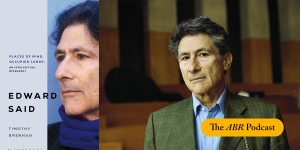Timothy Brennan
Edward Said, most regarded for his pioneering study Orientalism (1978), led a varied life that combined rigorous scholarship with fearless activism. Born in Jerusalem and brought up in Cairo, Said left for America at the age of sixteen and thereafter steadily ascended through the ranks of the American academy. Outside of the ivory tower, Said became a powerful spokesperson for Palestinian self-determination. Timothy Brennan’s new biography, Places of Mind: A Life of Edward Said, traces Said’s decades of engagement with the key political, cultural, and literary concerns of his time. As James Jiang notes in his review, ‘what emerges most distinctly from Brennan’s portrait are not the lineaments of a gifted “mind”, but rather the sheer messiness of thinking for a living’.
... (read more)James Jiang reviews 'Places of Mind: A life of Edward Said' by Timothy Brennan
When the leukaemia with which he had been diagnosed in 1991 claimed his life twelve years later, Edward W. Said left behind more than the usual testaments to a successful academic career: landmark studies, bountiful citations, bereft colleagues, and the cadres of pupils whose intellectual maturation he had overseen. More importantly, he embodied a many-sided ideal of intellectual and civic engagement that combined the vita contemplativa with the vita activa. A professor in Columbia University’s Department of English and Comparative Literature for forty years, Said was a member of the exiled Palestinian National Council and arguably the most visible advocate for the Palestinian cause throughout his later life.
... (read more)

